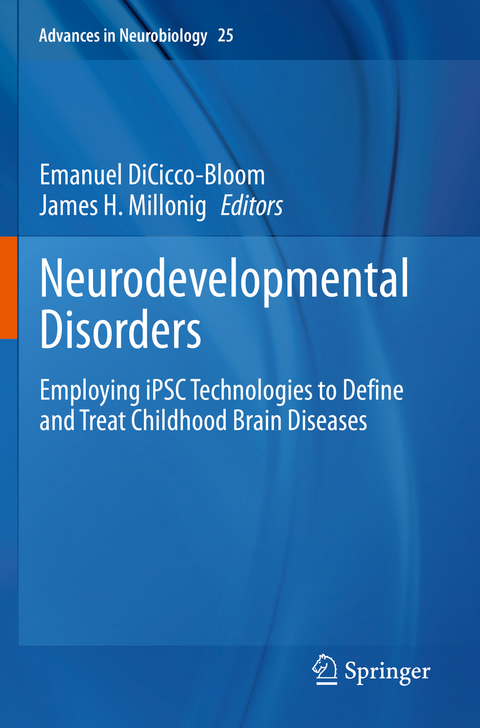
Neurodevelopmental Disorders
Springer International Publishing (Verlag)
978-3-030-45495-1 (ISBN)
This book contains a compendium of induced pluripotent stem cells (iPSCs) articles and reviews concerning state of the art technologies and how they are being applied to human neurodevelopmental disorders. With the establishment of effective technologies to produce iPSCs and their derivatives, like neural precursors, neurons, and glia, researchers have new platforms to study neurodevelopmental disorders. iPSC technology enables researchers to study how human neurons develop in individuals with neurodevelopmental disorders, providing an unparalleled opportunity to investigate their etiology. In turn, researchers have now begun to understand the underlying molecular and cellular pathways that contribute to human diseases. iPSCs technologies also provide an emerging tool for future translational studies and disease classification. The chapters will emphasize how among the diverse idiopathic and genetic disorders, there are common clinical as well as cellular andmolecular phenotypes.
Emanuel DiCicco-Bloom, M.D. is Professor of Neuroscience and Cell Biology and Pediatrics (Child Neurology & Neurodevelopmental Disabilities) at Rutgers Robert Wood Johnson Medical School (RWJMS) in New Jersey and a member of graduate programs in Cell & Developmental Biology, Neuroscience, and Toxicology at Rutgers University. He graduated summa cum laude from Princeton University, received his M.D. from then Cornell University Medical College, and trained in Pediatrics and Neurology at New York Hospital-Cornell Medical Center, joining RWJMS in 1990.
Dr. DiCicco-Bloom has broad experience performing basic and translational research on neurodevelopmental disorders including animal models and human induced pluripotent stem cells (iPCSs). As an active child neurologist, his research focuses on defining molecular and cellular pathways that regulate production of neuronal cells (neurogenesis) during brain development, and how related abnormalities contribute to developmental disorders including autism. He investigates how growth signals, genetic factors, and environmental toxins impact cell proliferation, survival, and fate determination during brain development using rat and mouse neural stem cells in culture and in vivo, with a focus on the cerebral cortex, cerebellum, and hippocampus. To begin defining mechanisms that are more directly relevant to human disorders, recent collaborative studies with Co-Editor James H. Millonig, Ph.D. have focused on creating human induced neural stem cells (NPCs) from people with autism, to determine their neurobiological signatures. Significantly, by comparing NPCs from two forms of autism, including idiopathic and genetically defined (CNV 16p11.2 Deletion Syndrome), these studies reveal a common neurobiological phenotype consisting of reduced neural process outgrowth and cell migration in autism compared to control NPCs. Moreover dysregulation of the mTOR signaling pathway appears to be central to these phenotypes, as pathway manipulation both corrects autism deficits and recreates abnormalities in relevant controls. This new era of exploring neuropsychiatric conditions in human neurons may provide more relevant cellular and molecular pathways on which to target therapeutic interventions that may be "personalized" to the needs of the specific individual.
Dr. DiCicco-Bloom has long served the autism scientific and advocacy communities, providing scientific expertise to federal agencies including NIH, DOD, NSF, and IACC, and disease advocacy organizations including National Alliance for Autism Research, Autism Science Foundation, Autism Speaks, Autism Tissue Program, Brain Canada, Rett Syndrome Foundation, and Simons Foundation. He Chaired the Scientific Program Committee of the 2008 International Meeting for Autism Research (IMFAR) meeting (London) and Co-Chaired 2010 (Philadelphia), and has long served the IMFAR Program Committee. For the Society for Neuroscience, he has served on many committees (PECC, GPA, Audit, Rigor and Reproducibility Working Group) and as a Councilor. Currently, he is Chair of the NIH Developmental Brain Disorders Study Section, is a member of the DOD Autism Research Program and the American Brain Coalition (ABC) Board of Directors, and serves as Scientific Advisor to the Eagles Autism Foundation. He serves on the editorial boards of Autism Research, Molecular Autism, and other developmental neuroscience journals, and has authored numerous research articles and book chapters in neuroscience, child neurology, and psychiatry.
James H. Millonig Ph.D. is associate professor in the department of Neuroscience and Cell Biology and resident member in the Center for Advanced Biotechnology and Medicine at Robert Wood Johnson Medical School-Rutgers University.
Dr. Millonig graduated from The University of Rochester magna cum laude with a B.S. in Biochemistry. After colle
1. Modeling neurodevelopmental deficits in Tuberous Sclerosis Complex with stem cell-derived neural precursors and neurons.- 2. Advances in human stem cells and genome editing to understand and develop treatment for Fragile X syndrome.- 3. IPSC MODELS OF CHROMOSOME 15Q IMPRINTING DISORDERS: FROM DISEASE MODELING TO THERAPEUTIC STRATEGIES.- 4. Creating iPSC based models to understand the signaling and cellular phenotypes in idiopathic autism and 16p11.2 derived neurons.- 5. Dysregulation of Neurite Outgrowth and Cell Migration in Autism and other Neurodevelopmental Disorders.- 6. Investigation of Schizophrenia with Human Induced Pluripotent Stem Cells.- 7. Modeling Inflammation on Neurodevelopmental disorders using pluripotent stem cells.- 8. Astrocyte-derived exosomes in an iPSC model of bipolar disorder.- 9. Two- and there-dimensional stem cell models to define mechanisms underlying psychiatric disorders.- 10. Development of a 3-D organoid system using human induced pluripotent stem cells to model idiopathic autism.
| Erscheinungsdatum | 26.06.2021 |
|---|---|
| Reihe/Serie | Advances in Neurobiology |
| Zusatzinfo | IX, 305 p. 26 illus., 23 illus. in color. |
| Verlagsort | Cham |
| Sprache | englisch |
| Maße | 155 x 235 mm |
| Gewicht | 486 g |
| Themenwelt | Medizin / Pharmazie ► Studium |
| Naturwissenschaften ► Biologie ► Humanbiologie | |
| Schlagworte | Autism • Bipolar Disorder • iPSCs • Neurodevelopmental Gene Risk Factors • Schizophrenia • syndromic autism |
| ISBN-10 | 3-030-45495-9 / 3030454959 |
| ISBN-13 | 978-3-030-45495-1 / 9783030454951 |
| Zustand | Neuware |
| Haben Sie eine Frage zum Produkt? |
aus dem Bereich


